Related Research Articles
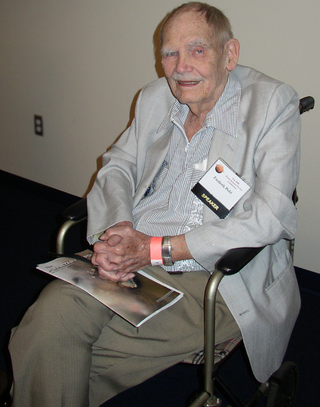
Frederik George Pohl Jr. was an American science-fiction writer, editor, and fan, with a career spanning nearly 75 years—from his first published work, the 1937 poem "Elegy to a Dead Satellite: Luna", to the 2011 novel All the Lives He Led.

Hugo Gernsback was an Luxembourgish editor and magazine publisher whose publications included the first science fiction magazine, Amazing Stories. His contributions to the genre as publisher were so significant that, along with the novelists Jules Verne and H. G. Wells, he is sometimes called "The Father of Science Fiction". In his honor, annual awards presented at the World Science Fiction Convention are named the "Hugos".

The Science Fiction and Fantasy Writers of America, doing business as Science Fiction and Fantasy Writers Association, commonly known as SFWA is a nonprofit 501(c)(3) organization of professional science fiction and fantasy writers. While SFWA is based in the United States, its membership is open to writers worldwide. The organization was founded in 1965 by Damon Knight under the name Science Fiction Writers of America. The president of SFWA as of July 1, 2021 is Jeffe Kennedy.

Damon Francis Knight was an American science fiction author, editor, and critic. He is the author of "To Serve Man", a 1950 short story adapted for The Twilight Zone. He was married to fellow writer Kate Wilhelm.
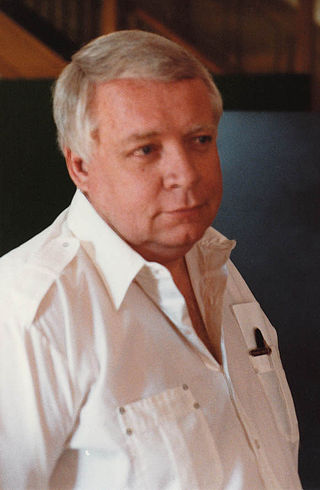
Algirdas Jonas "Algis" Budrys was a Lithuanian-American science fiction author, editor, and critic. He was also known under the pen names Frank Mason, Alger Rome in collaboration with Jerome Bixby, John A. Sentry, William Scarff, and Paul Janvier. In 1960, he authored Rogue Moon, a novel.
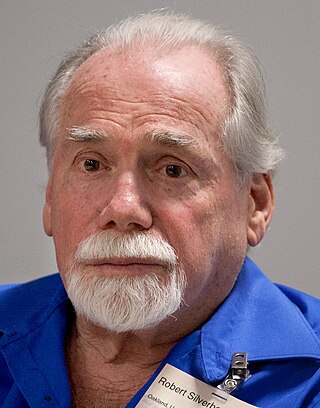
Robert Silverberg is an American author and editor, best known for writing science fiction. He is a multiple winner of both Hugo and Nebula Awards, a member of the Science Fiction and Fantasy Hall of Fame, and a Grand Master of SF. He has attended every Hugo Award ceremony since the inaugural event in 1953.

Daniel Francis Galouye was an American science fiction writer. During the 1950s and 1960s, he contributed novelettes and short stories to various digest size science fiction magazines, sometimes writing under the pseudonym Louis G. Daniels.

Michael Diamond Resnick was an American science fiction writer and editor. He won five Hugo awards and a Nebula award, and was the guest of honor at Chicon 7. He was the executive editor of the defunct magazine Jim Baen's Universe, and the creator and editor of Galaxy's Edge magazine.
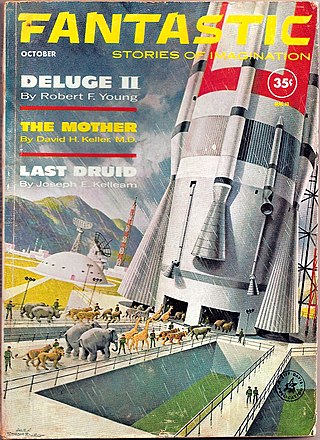
Fantastic was an American digest-size fantasy and science fiction magazine, published from 1952 to 1980. It was founded by the publishing company Ziff Davis as a fantasy companion to Amazing Stories. Early sales were good, and the company quickly decided to switch Amazing from pulp format to digest, and to cease publication of their other science fiction pulp, Fantastic Adventures. Within a few years sales fell, and Howard Browne, the editor, was forced to switch the focus to science fiction rather than fantasy. Browne lost interest in the magazine as a result and the magazine generally ran poor-quality fiction in the mid-1950s, under Browne and his successor, Paul W. Fairman.

Kevin O'Donnell Jr. was an American science fiction author. He was the son of Kevin O'Donnell, who served as director of the Peace Corps in 1971–72.
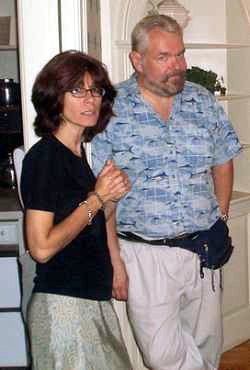
Kathe Koja is an American writer. She was initially known for her intense speculative fiction for adults, but has written young adult novels, the historical fiction Under the Poppy trilogy, and a fictional biography of Christopher Marlowe.
Jean Rabe is an American journalist, editor, gamer and writer of fantasy and mystery. After a career as a newspaper reporter, she was employed by TSR, Inc. for several years as head of the Role Playing Game Association and editor of the Polyhedron magazine. Rabe began a career as a novelist for TSR and Wizards of the Coast, and over the last 30 years has produced over three dozen books and scores of short stories, at first in the genres of game-related fantasy and science fiction and later as an author of mystery novels.

Jim Baen's Universe (JBU) was a bimonthly online fantasy and science fiction magazine created by Jim Baen. It was recognized by the SFWA as a Qualifying Short Fiction Venue. JBU began soliciting materials in January 2006 and launched in June 2006. The magazine contained around 120,000 to 150,000 words per issue. It closed in 2010.

Henry Slesar was an American author and playwright. He is famous for his use of irony and twist endings. After reading Slesar's "M Is for the Many" in Ellery Queen's Mystery Magazine, Alfred Hitchcock bought it for adaptation and they began many successful collaborations. Slesar wrote hundreds of scripts for television series and soap operas, leading TV Guide to call him "the writer with the largest audience in America."
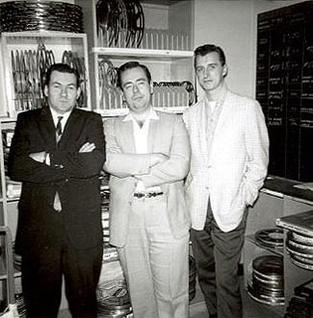
James Judson Harmon, better known as Jim Harmon, was an American short story author and popular culture historian who wrote extensively about the Golden Age of Radio. He sometimes used the pseudonym Judson Grey, and occasionally he was labeled Mr. Nostalgia.
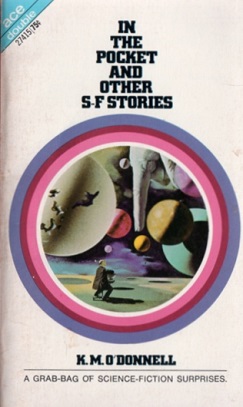
In The Pocket: And Other SF Stories is a collection of science fiction stories by American writer Barry N. Malzberg, published under his "K. M. O'Donnell" byname. The collection was issued as an Ace Double in 1971, bound together with Malzberg's Gather in the Hall of the Planets.
List of the published work of Barry N. Malzberg, American writer.

The Falling Astronauts is a science fiction novel by American writer Barry N. Malzberg, first published in 1971 in a paperback edition by Ace Books.
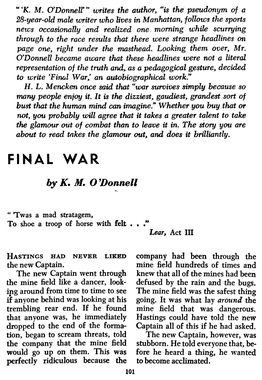
"Final War" is a short story by American author Barry N. Malzberg under the pseudonym K. M. O'Donnell. It was first published in the April 1968 issue of The Magazine of Fantasy & Science Fiction.
References
- ↑ Charles Platt. 'Barry Malzberg' in The Dream Makers. Berkley, 1980. pp77-86.
- ↑ Gunn, James E. (2003). The Road to Science Fiction: From here to forever. ISBN 9780810846708.
- ↑ Debut Science Fiction and Fantasy
- ↑ Barry Malzberg, 'Repentance, Desire, and Natalie Wood', eI22 -- October 2005
- ↑ Barry Malzberg's entry at the Science Fiction Encyclopedia
- ↑ Barry Malzberg. 'In The Hall of the Mountain King', Amazing Stories, 4 February 2013
- ↑ Barry Malzberg,'Is the Most Speculative Form of Fiction Afraid to Gamble Anymore . . . ?', Amazing, Stories, July 1981
- ↑ Barry Malzberg. 'Some Notes on the Lone Wolf', Breakfast in the Ruins, Baen Books, 2007. Pp296-298
- ↑ collected in Barry Malzberg, '…And a Chaser', in Fantastic Lives edited by Martin H. Greenberg, Southern Illinois University Press, 1981. pp102-117.
- ↑ "Galaxy Bookshelf", Galaxy Science Fiction , October 1973, p.103
- ↑ Anders, Charlie Jane (6 June 2013). "The editor of SFWA's bulletin resigns over sexist articles". io9 . Retrieved 7 June 2013.
- ↑ Page, Jeffrey. "RAMPAGING COMPUTERS", The Record (Bergen County) , March 1, 1993. Accessed September 10, 2009. "Malzberg, of Teaneck, opened the mail and found a warrant had been issued for his arrest because, the computer's microchips insisted, he had failed to pay a parking ticket 9½ years ago."